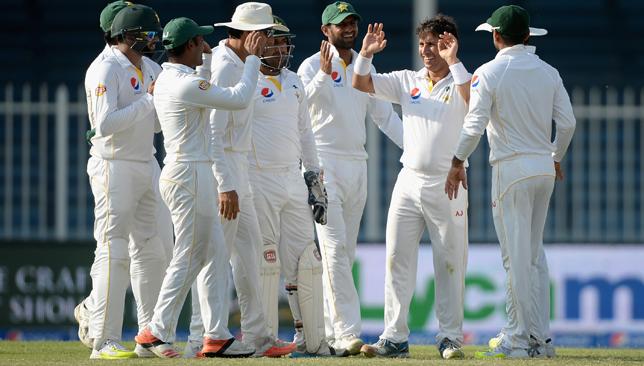
Yasir Shah wraps an England batsman on his pads, Sarfraz Ahmed erupts, as do three Pakistan fielders around the bat.
Voices shrilled, loud and the protagonists jumping on the spot, arms aloft, you instantly recognise that this reaction must mean it’s close.
A shake of the head from the umpire, however, results in the players in this pantomime turn heel and restart for the next ball.
– PAKvsEng: Mohammad Hafeez leads fightback in final Test
– Bangladesh: Zimbabwe shrug off security concerns
Their reaction seems to suggest that it was never in doubt, it was never out.
They’re right.
The ball pitched and hit the batsman outside leg stump and wasn’t going to hit the stumps.
It had nothing going for it, but that did not stop the fielders going up as if it was plum.
Now, this is not a new trait to a sport rich in its nuances.
Sub-continent teams, in particular, have been guilty of excessive appealing since what feels like the dawn of time.
And while Pakistan’s desperate please reached their lowest point in the second Test in Dubai – as they tried everything in their powers to force a win that should have been far more routine – it is certainly not a trend limited to this series’ hosts.
WICKET: @StuartBroad8 is back. He digs one into Younus’ pads and the No.4 is gone for 14. PAK 146-3, lead 74. pic.twitter.com/KgOF9evKKK
— England Cricket (@englandcricket) November 3, 2015
Jonny Bairstow went up with gusto to a Samit Patel delivery on day three which would have missed three sets of stumps.
It was ridiculous.
Even more so, the whole routine is now rather redundant thanks to reviews.
Bowlers and ‘keepers have a pretty good understanding of what is close and what isn’t and batsmen nine times out of ten know if they’ve hit it or not.
So ,presuming the team in question have reviews in the bank, an overzealous appeal for a dubious lbw or caught behind are a waste of energy; energy in the heat of the UAE that is being sapped by your mere existence.
An example of this – albeit an instance with genuine doubt – came on day three of this third and final Test when Mohammad Hafeez successfully appealed an edge behind.
England, and umpire Bruce Oxenford, believed Hafeez to have edged James Anderson behind only for the batsman to instantly review and TV replays to show a gap between bat and pad.
James Taylor here now for England. As far as I’m aware he is NOT retiring. pic.twitter.com/P8xdaa9MIO
— Barny Read (@BarnabyRead) November 3, 2015
There must have been a noise on the field and if there wasn’t it was yet another fruitless exercise.
The frequency of the latter doesn’t seem to be deterring the two teams here, however.
A litany of roaring appeals have filled this series, their echoes reverberating around the empty stadiums despite their ineptness at impacting any of the action.
Not only have fielders given up on appeals as if under some kind of Jedi mind trick at the hands of the standing umpires, they have also been denied time and again by the man upstairs (the third umpire, not Him).
As day two came to a close in Sharjah a stat appeared on the TV monitors that showed out of 38 reviews so far, only five had been successful.
Shoaib Malik is just announcing his retirement from Test cricket. Strange timing. He’s got a job to do in the second England innings
— Paul Newman (@Paul_NewmanDM) November 3, 2015
Pakistan had a record of 3-17 with their appeals, England equally appalling in their appeals, their fighting record 2-9.
If players continue to gamble in this manner, they will unfortunately be going hungry during games.
The odds, quite simply, are NEVER in their favour…